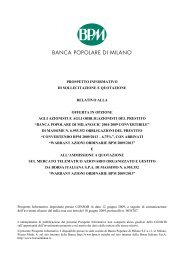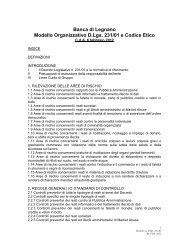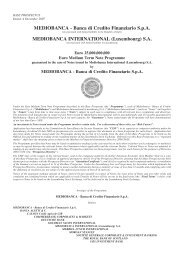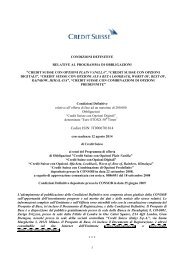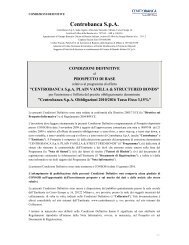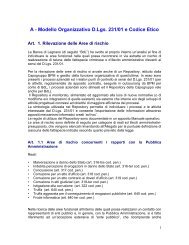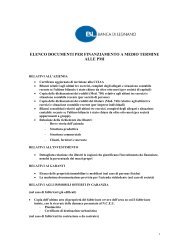INDEX OF DEFINED TERMS - Banca di Legnano
INDEX OF DEFINED TERMS - Banca di Legnano
INDEX OF DEFINED TERMS - Banca di Legnano
You also want an ePaper? Increase the reach of your titles
YUMPU automatically turns print PDFs into web optimized ePapers that Google loves.
Level: 2 – From: 2 – Wednesday, July 21, 2010 – 12:12 – eprint6 – 4247 Section 06<br />
Ad<strong>di</strong>tional Terms and Con<strong>di</strong>tions for Index Linked Notes<br />
(c)<br />
if “Mo<strong>di</strong>fied Postponement” is specified as applying in the applicable Final Terms then:<br />
(i)<br />
(ii)<br />
(iii)<br />
(iv)<br />
where the Index Linked Notes relate to a single Index, the Averaging Date shall be the<br />
first succee<strong>di</strong>ng Valid Date. If the first succee<strong>di</strong>ng Valid Date has not occurred as of<br />
the Valuation Time on the Averaging Cut-Off Date or if such Averaging Date falls on<br />
the Averaging Cut-Off Date owing to the original date on which it was scheduled to<br />
fall not being a Scheduled Tra<strong>di</strong>ng Day for the Index, then (A) the Averaging Cut-Off<br />
Date shall be deemed to be the Averaging Date (irrespective of whether the Averaging<br />
Cut-Off Date is already an Averaging Date), and (B) the Calculation Agent shall<br />
determine the relevant level or price for that Averaging Date in accordance with subparagraph<br />
(a)(ii) of the definition of “Valuation Date” below;<br />
where the Index Linked Notes relate to a Basket of In<strong>di</strong>ces and the applicable Final<br />
Terms provides that “Common Scheduled Tra<strong>di</strong>ng Days” shall not be applicable, the<br />
Averaging Date for each Index not affected by the occurrence of a Disrupted Day shall<br />
be the originally designated Averaging Date (following adjustment of such date owing<br />
to the original date not being a Scheduled Tra<strong>di</strong>ng Day, if applicable) (the “Scheduled<br />
Averaging Date”) and the Averaging Date for an Index affected by the occurrence of a<br />
Disrupted Day shall be the first succee<strong>di</strong>ng Valid Date in relation to such Index. If the<br />
first succee<strong>di</strong>ng Valid Date in relation to such Index has not occurred as of the<br />
Valuation Time on the Averaging Cut-Off Date or if such Averaging Date falls on the<br />
Averaging Cut-Off Date owing to the original date on which it was scheduled to fall<br />
not being a Scheduled Tra<strong>di</strong>ng Day for the Index, then (A) the Averaging Cut-Off Date<br />
shall be deemed to be the Averaging Date (irrespective of whether the Averaging Cut-<br />
Off Date is already an Averaging Date) in relation to such Index, and (B) the<br />
Calculation Agent shall determine the relevant level or price for that Averaging Date in<br />
accordance with sub-paragraph (b)(ii) of the definition of “Valuation Date” below;<br />
where the Index Linked Notes relate to a Basket of In<strong>di</strong>ces and the applicable Final<br />
Terms provides that “Common Scheduled Tra<strong>di</strong>ng Days” and “In<strong>di</strong>vidual Disrupted<br />
Days” shall be applicable, the Averaging Date for each Index not affected by the<br />
occurrence of a Disrupted Day shall be the originally designated Averaging Date<br />
(following adjustment of such date owing to the original date not being a Common<br />
Scheduled Tra<strong>di</strong>ng Day, if applicable) (the “Scheduled Averaging Date”) and the<br />
Averaging Date for an Index affected by the occurrence of a Disrupted Day shall be<br />
the first succee<strong>di</strong>ng Valid Date in relation to such Index. If the first succee<strong>di</strong>ng Valid<br />
Date in relation to such Index has not occurred as of the Valuation Time on the<br />
Averaging Cut-Off Date or if such Averaging Date falls on the Averaging Cut-Off Date<br />
owing to the original date on which it was scheduled to fall not being a Common<br />
Scheduled Tra<strong>di</strong>ng Day for the Index, then (A) the Averaging Cut-Off Date shall be<br />
deemed to be the Averaging Date (irrespective of whether the Averaging Cut-Off Date<br />
is already an Averaging Date) in relation to such Index, and (B) the Calculation Agent<br />
shall determine the relevant level or price for that Averaging Date in accordance with<br />
sub-paragraph (c)(ii) of the definition of “Valuation Date” below; or<br />
where the Index Linked Notes relate to a Basket of In<strong>di</strong>ces and the applicable Final<br />
Terms provides that “Common Scheduled Tra<strong>di</strong>ng Days” and “Common Disrupted<br />
Days” shall be applicable, the Averaging Date for each Index shall be the first<br />
succee<strong>di</strong>ng Common Valid Date in relation to such Index. If the first succee<strong>di</strong>ng<br />
Common Valid Date has not occurred as of the Valuation Time on the Averaging Cut-<br />
Off Date or if such Averaging Date falls on the Averaging Cut-Off Date owing to the<br />
original date on which it was scheduled to fall not being a Common Scheduled<br />
93



